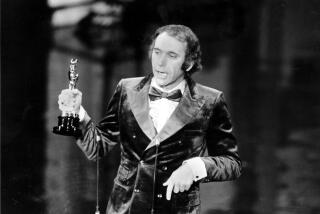Studio City Resident Deserves Star on Hollywood Walk of Fame
- Share via
The fabric of our communities is interwoven with people of all sizes, shapes, backgrounds and points of view. Yet community organizations such as homeowner associations are seldom viewed as diverse or interesting.
Because of their unrelenting focus on development, such associations are mostly seen as monolithic groups of residents bonded together by their strong views on land-use issues.
As president of the Studio City Residents Assn., I am usually associated with campaigns against big-box retail complexes and poorly planned mini-malls. Of course, development, safety, transportation and other quality-of-life issues deeply impact a community and are worthy of the countless volunteer hours dedicated by groups like our association. But although vitally important, development issues don’t totally shape our communities. People do that and in the process make our lives better and more worthwhile.
That is why I have become involved in a campaign to get a star on the Hollywood Walk of Fame for Ben Rinaldo, a longtime Studio City resident, in recognition of his achievements in the entertainment field.
It was 65 years ago, in 1935, that Rinaldo, a Hollywood agent who brought the all-black Hall Johnson Choir from New York to work in “The Green Pastures” at Warner Bros., found the financing to co-write, produce and distribute “Dark Manhattan,” one of the first all-black-cast full-length feature films made in Hollywood.
“Dark Manhattan” sparked a revival of a tradition of all-black-cast movies when the African American screen had considerably dimmed because of the Depression and rising costs. The film’s production and its distribution also mark important milestones in black film and Hollywood history because it opened the doors for future films featuring African American actors in leading roles instead of portraying servants, maids or musicians.
Rinaldo established a partnership with George Randol, an African American actor who had come west to appear in “The Green Pastures” in 1935. Intrigued with black cinema and the prospect of financial success, Randol and Rinaldo formed a partnership to produce the film. Flush with a $25,000 commission from the sale of Rinaldo client Anthony Quinn’s contract to the legendary Cecil B. DeMille, the newly formed production company made “Dark Manhattan.” Rinaldo soon learned, however, that producing the film was the easy part. Distribution was much more challenging.
*
Having no knowledge of film distribution, Rinaldo, then 25, nonetheless spent seven months touring all 48 states and secured more than 1,200 bookings. Toward the end of his trip, Rinaldo was nearly killed in Pulaski, Tenn., when he attempted to secure a booking from a white theater owner who also happened to be head of the local Ku Klux Klan. The theater owner was upset by a Jewish man distributing a black film. A fight ensued, but Rinaldo managed to escape unharmed--except for the 11 bullet holes in his car.
*
When he returned from his trip, he discovered that financial problems at the Hollywood office had brought the business to ruins and with it Randol-Rinaldo Productions and Rinaldo’s venture into black filmmaking.
Despite the misfortune, what had started simply as a moneymaking venture became a life-changing experience for Rinaldo and a watershed event in black film history. Having been exposed to the grim reality of racism and double standards in America, Rinaldo became a fervent political and civil rights activist.
After researching this story and Rinaldo’s role as a film pioneer, I feel strongly that his achievement deserves recognition. More importantly, I feel that through acknowledgment of Rinaldo’s work, awareness and recognition of this important yet overlooked part of Hollywood history can be achieved.
Rinaldo’s story also reflects the human side of our community, a side that is very worthy of our support.
More to Read
Only good movies
Get the Indie Focus newsletter, Mark Olsen's weekly guide to the world of cinema.
You may occasionally receive promotional content from the Los Angeles Times.










